The United Kingdom appears to be retaining or consolidating the global centre of gravity status in knowledge production as a Times Higher Education, (THE) ranking of the Most International Universities in the World is showing two of the top five universities in that category in the country. These are Oxford University and Imperial College London. But these are the 4th and 5th positions, with the first and third positions going to China, though not Mainland China but Hong Kong. Does it matter if one wants to say that China is now the evidence of the postmodern imagination of the world today as decentered? The two universities are the University of Hong Kong and the Chinese University of Hong Kong. The second university on the list is the ETH, Zurich, the Harvard of Switzerland if they do not find such label provocative.
 The data which shows up the universities as “some of the most international universities in the world” came from the international student score, international staff score, international co-authorship score and international reputation metrics collected for the Times Higher Education World University Rankings 2021, according to THE.
The data which shows up the universities as “some of the most international universities in the world” came from the international student score, international staff score, international co-authorship score and international reputation metrics collected for the Times Higher Education World University Rankings 2021, according to THE.
It also says these institutions all have a high proportion of international students and staff, collaborate on research with scholars from across the world, and have a strong global reputation to match, pointing out how research suggests improved teaching and learning experience with diverse communities of students.
THE ran the following comments on the new rising centres of global knowledge power in the wake of Covid-19:
Top five most international universities in the world
The University of Hong Kong has embarked on a mission to become “Asia’s global university”, which includes the goal of giving all its undergraduates two opportunities to study outside Hong Kong during their degree by 2022.
Overall, this Hong Kong university has more than 30,000 students, of which more than 35 per cent are international.
Teaching at the institution is in English and education has an international focus, with the aim of preparing students to become global citizens who could be successful anywhere in the world.
It is no surprise that Switzerland is home to some of the most international universities in the world, given its situation in the heart of Europe, surrounded by France, Italy, Germany, Austria and Liechtenstein.
ETH Zurich is located in Switzerland’s largest city, Zurich, which is known for being very safe (although expensive). The main spoken language is Swiss German, but the university also offers courses in English.
The institution has more than 22,000 students from over 120 countries and is the top university in continental Europe.
The university focuses on teaching and research in the STEM subjects, and 21 Nobel prizes have been awarded to students and teachers connected to the institution. One of the most famous alumni is Albert Einstein.
Students from more than 50 countries study at the Chinese University of Hong Kong.
The university has exchange partnerships with more than 282 institutions in 36 countries and regions. Some 6,000 students study abroad or take part in a learning abroad programme or internship.
The University of Oxford is not only the top university in the world, it also happens to be one of the most international.
Over a third of students at the University of Oxford are international students coming from 160 countries and territories. In fact, international students have been attending the University of Oxford for hundreds of years, with the first international student arriving way back in 1190.
Almost half of the staff at the university are also international and the institution has links with many other institutions worldwide.
Imperial College London focuses teaching and learning around science, engineering, medicine and business.
More than 60 per cent of students are international, with undergraduates coming from over 125 countries.
The 6th – 20th position on the list are occupied by the following universities:
A few surprises observable on the list of 6 – 20th is the University of Auckland coming before Australian National University and all two coming before LSE (although ANU has almost always done that) and all three coming ahead of the University of British Columbia and then all four coming before the Oxford of Scotland – the tough University of Edinburgh, no thanks to Covid-19 related shake up of the world within just one year.
Could Covid-19 also be the reason why McGill University in Canada, the University of Melbourne in Australia and MIT in the US are completely out of the first 20? As difficult and even meaningless as it is to give a university a flat rating, universities such as British Columbia, ANU, McGill, Melbourne are some of the toughest campuses in recent years after the global top ten, usually Harvard, Oxford, Cambridge, Stanford, Imperial College, UCL, Yale, Chicago, UCLA, University of California, Berkley, Princeton, Edinburgh and John Hopkins.
The good news is that the University of Cape Town showed up on the list. At 155th position in the full list, it still came ahead of established big name campuses as Stanford, Harvard and Princeton, all in the US. Could that be a hint of the future ahead when an African university would be atop of the global map of the most rigorous knowledge production spaces? Well, for now and on this list, the evidence that Covid-19 has really peppered the US can be seen from the 57 – 60th position occupied by the University of California, Berkeley; John Hopkins University; Cornell and the University of Chicago, with Yale University down to 66th.
The global university ranking industry has been facing criticism recently from university administrators, especially in Australia and there have been proposals about how to do it better. Perhaps, a more stable ranking outcome may emerge in September when the traditional status ranking exercises come out and the world shall see which universities are sinking and which ones are rising and why such might have been possible, including the Covid-19 factor. The fear is whether this mini-ranking is not also a sign of a global shift in knowledge power corresponding to on-going geopolitical shifts? Only time will tell.
However it goes, the question is where a country such as Nigeria might find its universities on the ranking order, not later this year but say in 2025. Would Nigeria find the younger Ziks, Ahmadu Bellos and Awolowos and recapture the lost grounds or would things finally degenerate to nothingness very soon?




























